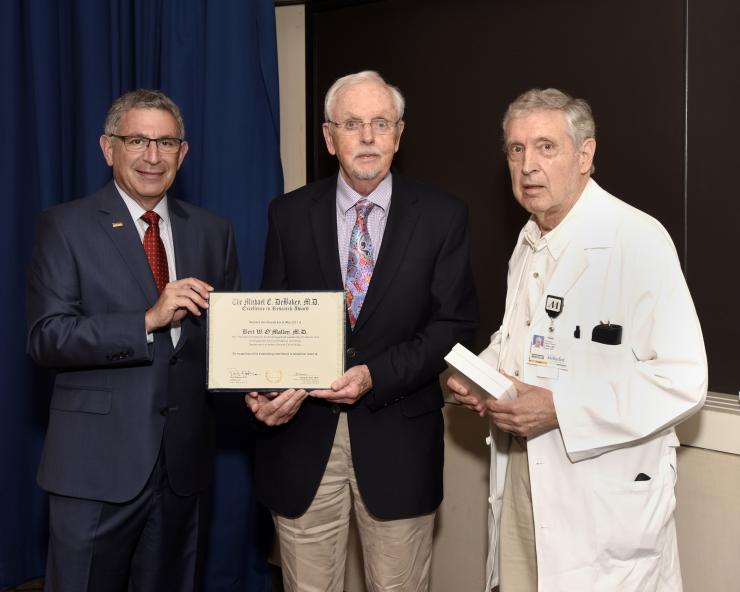2017 Recipient
Area: Molecular and Cell Biology
Tom Thompson Professor and Distinguished Leadership Professor and Distinguished Service Professor and Chair, Dept. Molecular and Cell Biology
Dr. Bert O’Malley, professor of molecular and cell biology, has focused his research on the molecular mechanisms that guide gene regulation in endocrinology and endocrine cancers. His work has improved our understanding of the molecular mechanisms by which hormones, receptors and coactivators contribute to the disease process. His pioneering work in this field has shown that intracellular hormones and cofactors act at the level of DNA to regulate the production of proteins and affect the function of the cell. Recent research reported in Molecular Cell was the first to solve the structure of a functional receptor-coactivator complex on DNA capable of regulating gene transcription in vitro. In addition, in a paper published in the Journal of Clinical Investigation, he showed that steroid receptor coactivator-2 (SRC-2), which is highly elevated in a variety of tumors, is likely implicated in metabolic coordination of cancer metastasis, opening the possibility of therapeutically targeting the SRC-2 pathway. His work with steroid receptor coactivator-3 (SRC-3), a prognostic marker for aggressive human breast cancer, showed that small-molecule inhibitors that directly bind SRC-3 cause selective degradation of the complex, hereby killing cancer cells with no observable toxicity. Small-molecule inhibitors represent a new type of oncologic drugs that target coactivators.
Dr. O'Malley's nomination was based on the following publications:
Yi P, Wang Z, Feng Q, Pintilie GD, Foulds CE, Lanz RB, Ludtke SJ, Schmid MF, Chiu W, O'Malley BW. Structure of a biologically active estrogen receptor-coactivator complex on DNA. Mol Cell. 2015 Mar 19;57(6):1047-58. doi: 10.1016/j.molcel.2015.01.025. Epub 2015 Feb 26.
Dasgupta S, Putluri N, Long W, Zhang B, Wang J, Kaushik AK, Arnold JM, Bhowmik SK, Stashi E, Brennan CA, Rajapakshe K, Coarfa C, Mitsiades N, Ittmann MM, Chinnaiyan AM, Sreekumar A, O'Malley BW. Coactivator SRC-2-dependent metabolic reprogramming mediates prostate cancer survival and metastasis. J Clin Invest. 2015 Mar 2;125(3):1174-88. doi: 10.1172/JCI76029. Epub 2015 Feb 9.
Wang L, Yu Y, Chow DC, Yan F, Hsu CC, Stossi F, Mancini MA, Palzkill T, Liao L, Zhou S, Xu J, Lonard DM, O'Malley BW. Characterization of a Steroid Receptor Coactivator Small Molecule Stimulator that Overstimulates Cancer Cells and Leads to Cell Stress and Death. Cancer Cell. 2015 Aug 10;28(2):240-52. doi: 10.1016/j.ccell.2015.07.005.
DeBakey Award Nominations
Baylor College of Medicine faculty members are invited to nominate colleagues for Michael E. DeBakey, M.D., Excellence in Research Awards. Learn more.








 Credit
Credit
